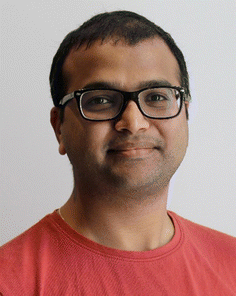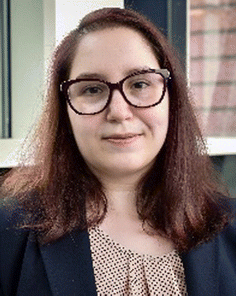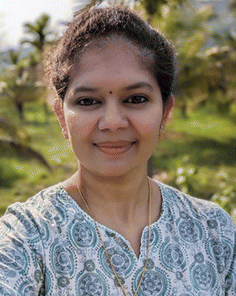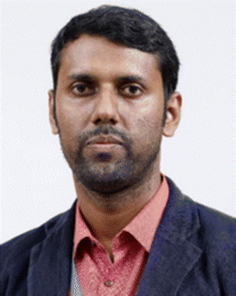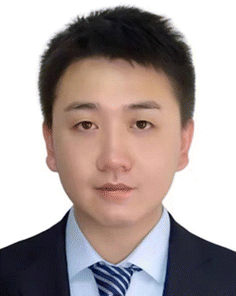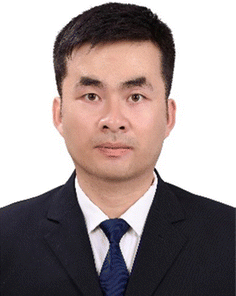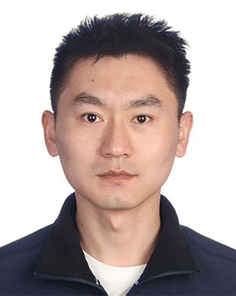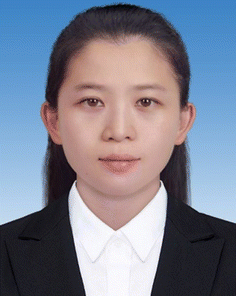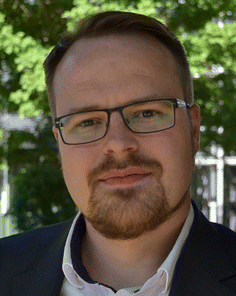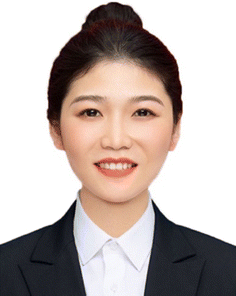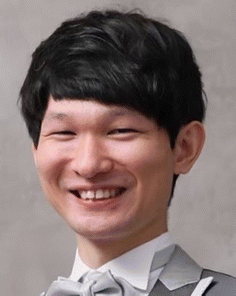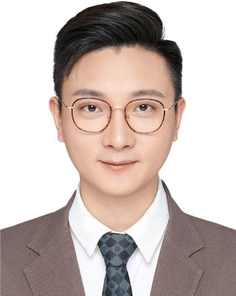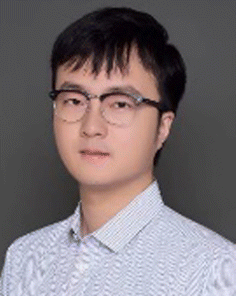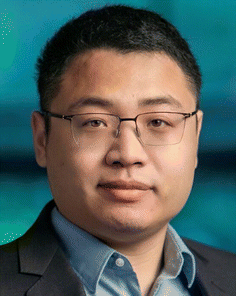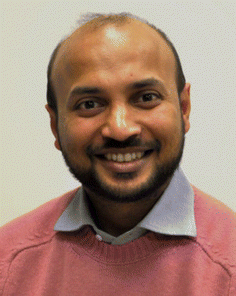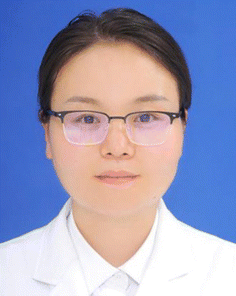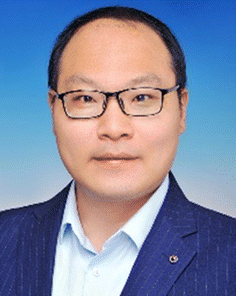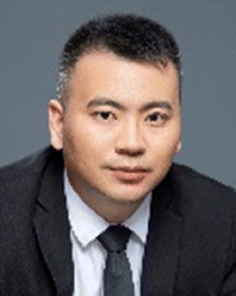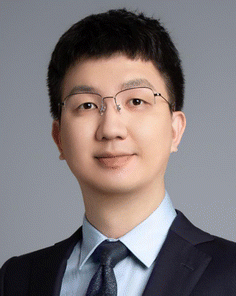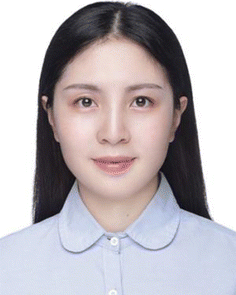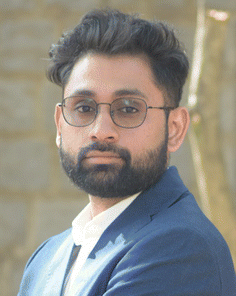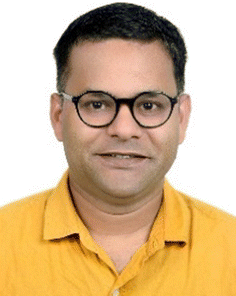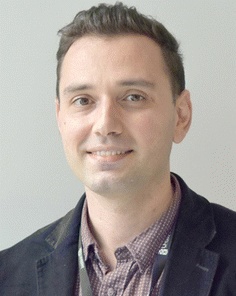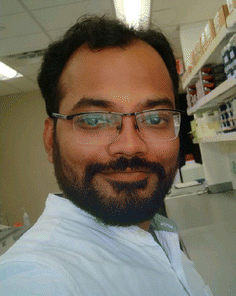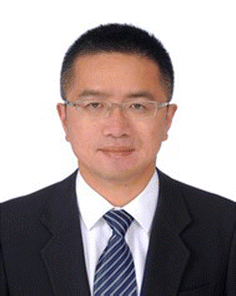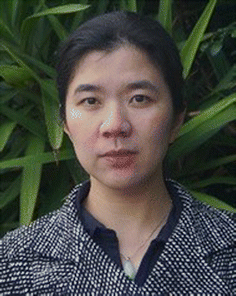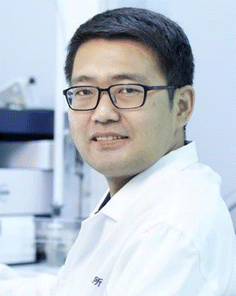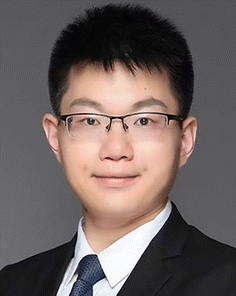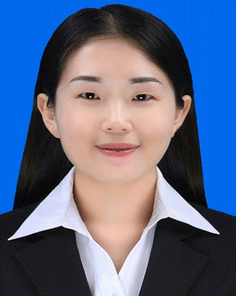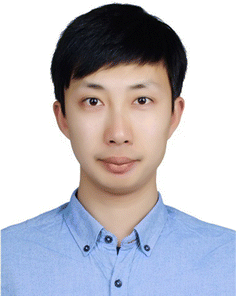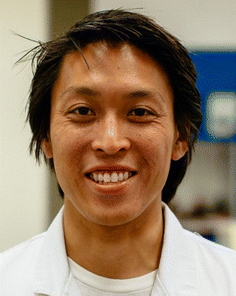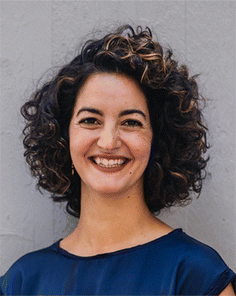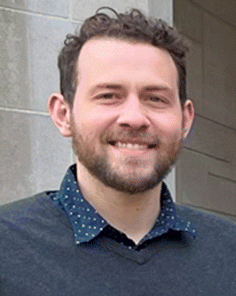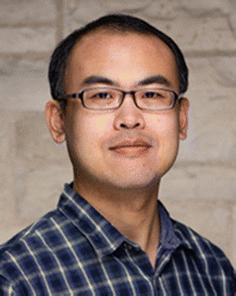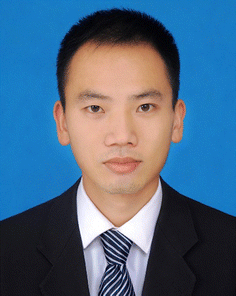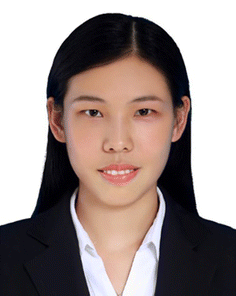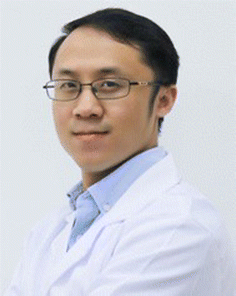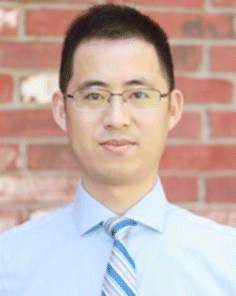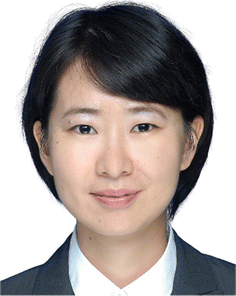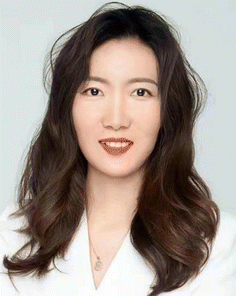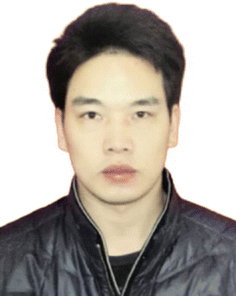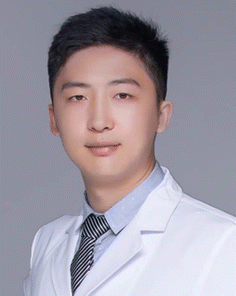DOI:
10.1039/D4TB90147A
(Profile)
J. Mater. Chem. B, 2024,
12, 10123-10133
Contributors to the Journal of Materials Chemistry B Emerging Investigators 2024 collection
Abstract
Our 2024 Emerging Investigators themed collections gather some of the best research being conducted by scientists in the early stages of their independent career. Each contributor was recommended as carrying out work with the potential to influence future directions in materials chemistry. Congratulations to all of the researchers featured, we hope you enjoy reading this collection.
Dr Vipul Agarwal is a Senior Lecturer at the University of New South Wales (UNSW). He joined UNSW in 2018 as a prestigious Australian National Health and Medical Research Council (NHMRC) Research Fellow in the School of Chemical Engineering. Prior to this, he was awarded the SERB-DST National Postdoctoral Fellowship to undertake postdoctoral training at the Indian Institute of Science, India. Dr Agarwal graduated with a PhD degree in Chemistry from The University of Western Australia, Australia in 2015. Dr Agarwal’s current research interest is in materials chemistry focusing on developing synthesis and fabrication strategies towards two- and three-dimensional polymer nanocomposites for a range of applications including neural tissue engineering.
His contribution to the 2024 Journal of Materials Chemistry B Emerging Investigators collection can be read at https://doi.org/10.1039/D4TB00755G.
Dr Bethany Almeida is an Assistant Professor at Clarkson University. The Almeida Lab’s research focuses on engineering advanced, functional biomaterials to modulate mesenchymal stem cell behavior with applications in tissue engineering and regenerative medicine. Dr Almeida is the recipient of several awards, including a 2020 BMES Career Development Award and a 2020 Rising Star in Engineering in Health. In addition to her BS and PhD in Biomedical Engineering, Dr Almeida also has a BS in Professional Writing and is passionate about science communication and K-12 outreach.
Her contribution to the 2024 Journal of Materials Chemistry B Emerging Investigators collection can be read at https://doi.org/10.1039/D4TB00716F.
Gowri M Balachander received her PhD from the Indian Institute of Science (IISc) Bangalore (2012) and did her post-doctoral fellowship at the National University of Singapore (NUS). She is currently an Assistant Professor at the Indian Institute of Technology (BHU) Varanasi in the School of Biomedical Engineering. She has worked extensively in developing organotypic models for breast cancer and liver and organ-on-a-chip models for NASH. She is passionate about the unsolved mysteries of liver regeneration and is setting up her lab and clinical collaborations to pursue her dream.
Her contribution to the 2024 Journal of Materials Chemistry B Emerging Investigators collection can be read at https://doi.org/10.1039/D4TB00738G.
Dr Subham Banerjee is currently working as an Associate Professor in the Department of Pharmaceutics, NIPER-Guwahati, Assam, India. He received his doctoral degree from the Birla Institute of Technology (BIT), Mesra in collaboration with the Defence Research Laboratory (DRL), DRDO, Tezpur, Assam in the year 2015. He is also a visiting staff faculty member of the University of Texas (UT) at Austin, USA. Dr Banerjee has published many international articles in peer-reviewed journals and bagged prestigious awards/recognitions. Dr Banerjee’s research area focuses on pharmaceutical additive manufacturing (AM)/3D and 4D printing, new materials for pharmaceutical AM, and cutting-edge translational pharmaceutical research.
His contribution to the 2024 Journal of Materials Chemistry B Emerging Investigators collection can be read at https://doi.org/10.1039/D4TB00168K.
Dr Jinjin Chen is currently a principal investigator at the Sun Yat-sen Memorial Hospital, Sun Yat-sen University, where his research team is focused on mRNA delivery and therapy. He received his BS degree in Chemistry from the University of Science and Technology of China. He then obtained his PhD in Polymer Chemistry under the guidance of Prof. Xuesi Chen from Changchun Institute of Applied Chemistry. He completed his postdoctoral fellowship at the Tufts University, working with Prof. Qiaobing Xu.
His contribution to the 2024 Journal of Materials Chemistry B Emerging Investigators collection can be read at https://doi.org/10.1039/D4TB00960F.
Dr Yilong Cheng is a professor in the School of Chemistry at Xi’an Jiaotong University. He obtained his BS degree in polymer chemistry from the University of Science and Technology of China in 2008 and completed his PhD studies under the supervision of Prof. Xuesi Chen in the Changchun Institute of Applied Chemistry in 2014. Then he joined Prof. Suzie Pun’s group as a Postdoctoral Fellow at the University of Washington for polymeric gene vector design. His current research interest is the development of functional polymeric hydrogels for various biomedical applications.
His contribution to the 2024 Journal of Materials Chemistry B Emerging Investigators collection can be read at https://doi.org/10.1039/D4TB00933A.
Dr Yuanchen Dong is a professor at the Institute of Chemistry, Chinese Academy of Sciences. He received his BS degree in Chemistry and Biotechnology from Jilin University in 2010 and his PhD degree in Polymer Chemistry and Physics from Tsinghua University in 2015. He did his postdoctoral research at Harvard Medical School. His current research interests are focused on the construction and assembly of DNA amphiphiles, structures and functions of proteins based on DNA self-assembly, construction of amphiphilic assembly with controllable size and morphology
via Frame Guided Assembly and applications of Cryo-EM in structural biology.
His contribution to the 2024 Journal of Materials Chemistry B Emerging Investigators collection can be read at https://doi.org/10.1039/D4TB00853G.
Zhengying Gu received her PhD in biomedical engineering from the University of Queensland, Australia. She is currently an Assistant Research Fellow at Shanghai Chest Hospital, Shanghai Jiao Tong University, School of Medicine, China. Her research interests focus on the study of immuno-metabolic interaction and the development of diagnostic and therapeutic nanotechnologies.
Her contribution to the 2024 Journal of Materials Chemistry B Emerging Investigators collection can be read at https://doi.org/10.1039/D4TB00865K.
Dr Johannes Gurke is a junior group leader and habilitation candidate at the University of Potsdam. He obtained his PhD degree in organic photochemistry from Humboldt-Universität zu Berlin. In his postdoctoral research, he worked with neuroscientists and biomedical engineers at the University of Cambridge, UK. His current research focuses on applying photochemistry to and
via biomedical engineering. Here, a particular emphasis lies on photopharmacology and lithographic 3D printing. His group covers organic synthetic aspects up to device fabrication.
His contribution to the 2024 Journal of Materials Chemistry B Emerging Investigators collection can be read at https://doi.org/10.1039/D4TB01117A.
Dr Lili Hao, received her PhD from the University of Science and Technology of China in June 2021, and currently serves as an associate professor at Nanjing Tech University. She is primarily engaged in the development of magneto-responsive biomaterials and the mechanism investigation of magneto-promoted osteogenesis, and her current research focuses on the fabrication and application research of novel intelligent responsive hydrogels and engineered cells. She has published over 10 papers in high-impact academic journals such as
Adv. Funct. Mater., and
J. Mater. Sci. Technol.
Her contribution to the 2024 Journal of Materials Chemistry B Emerging Investigators collection can be read at https://doi.org/10.1039/D4TB00743C.
Dr Marian Hettiaratchi is an Assistant Professor of Bioengineering at the Knight Campus for Accelerating Scientific Impact at the University of Oregon. She received a BSc in chemical engineering with a biomedical specialization from the University of Calgary and PhD in biomedical engineering from the Georgia Institute of Technology and Emory University. She was a Natural Sciences and Engineering Research Council of Canada (NSERC) postdoctoral fellow at the University of Toronto. Dr Hettiaratchi’s lab focuses on developing the next generation of affinity-controlled protein delivery vehicles through a unique combination of polymer chemistry, directed evolution platforms, statistical and bio-transport modeling, and rational protein design. She is the recipient of the NSF CAREER Award, NIH R21 Trailblazer Award, and NIH Maximizing Investigators’ Research Award.
Her contribution to the 2024 Journal of Materials Chemistry B Emerging Investigators collection can be read at https://doi.org/10.1039/D3TB01588B.
Christopher B. Highley is an Assistant Professor in the Departments of Biomedical Engineering and Chemical Engineering at the University of Virginia. His laboratory develops technology for fabricating material and cellular systems to address biomedical challenges. The lab aims to advance capabilities for building biological constructs and maintains a focus on the development and application of hydrogel biomaterials in this work and in addressing medical needs. He received his BSE in Biomedical Engineering at Duke University and his PhD in Biomedical Engineering at Carnegie Mellon University. He was a postdoctoral researcher at the University of Pennsylvania before beginning his independent career.
His contribution to the 2024 Journal of Materials Chemistry B Emerging Investigators collection can be read at https://doi.org/10.1039/D4TB00223G.
Shohei Ishikawa is a biomaterials scientist engaged in the research of functional polymer hydrogels in the fields of tissue engineering, regenerative medicine, and medical materials. Currently, Shohei Ishikawa is working as an Assistant Professor at the Department of Chemistry & Biotechnology, School of Engineering, the University of Tokyo. In 2020, they earned their PhD under the guidance of Professor Hidenori Otsuka at Tokyo University of Science. From 2020 to 2023, they worked as a postdoctoral researcher under Professor Takamasa Sakai and Professor Ungil Chung at the Department of Bioengineering, the University of Tokyo. In 2023, they transferred to the Department of Chemistry & Biotechnology at the University of Tokyo. Currently, they are focusing on the elucidation of novel gel science using hydrogels with phase separation structures and the development of scaffolds for tissue regeneration.
Their contribution to the 2024 Journal of Materials Chemistry B Emerging Investigators collection can be read at https://doi.org/10.1039/D4TB00761A.
Bing Jiang received his PhD degree in cell biology from the Institute of Biophysics, Chinese Academy of Sciences in 2019. Then he worked at the Nanozyme Laboratory in Zhongyuan, School of Basic Medical Sciences, Zhengzhou University and was promoted to associate professor in 2021. He focuses on nanozymes medical research, particularly the construction and application of efficient nanozyme systems from structural design to cascade catalysis.
His contribution to the 2024 Journal of Materials Chemistry B Emerging Investigators collection can be read at https://doi.org/10.1039/D4TB00508B.
Wei Jiang is a principal investigator at the Academy of Medical Sciences, Tianjian Laboratory of Advanced Biomedical Sciences of Zhengzhou University. He obtained his PhD degree from Jilin University in 2018. His research focuses on the biological applications of nanozymes. He currently serves as an academic editor for
Exploration.
His contribution to the 2024 Journal of Materials Chemistry B Emerging Investigators collection can be read at https://doi.org/10.1039/D4TB00900B.
Dr Yuanwen Jiang joined the University of Pennsylvania as an Assistant Professor of Materials Science and Engineering in 2023. His research has been focused on the design of bioelectronic materials and devices for medical applications. Dr Jiang received his BS in Chemistry from Nanjing University in 2012 and his PhD in Chemistry from the University of Chicago in 2018. Dr Jiang conducted his postdoctoral research at Stanford University in the Department of Chemical Engineering. His previous works have received several scientific recognitions, including the ACS Young Investigator Symposium Award, IUPAC-SOLVAY International Award for Young Chemists, and Baxter Young Investigator Award.
His contribution to the 2024 Journal of Materials Chemistry B Emerging Investigators collection can be read at https://doi.org/10.1039/D4TB00782D.
Mohit Kumar has been a group leader and Ramon y Cajal fellow at the University of Barcelona in Barcelona, Spain since 2023. His research interests range from supramolecular nanomaterials and active self-assembly to super-resolution imaging and nanomedicine. Mohit holds a Master’s degree in Chemistry from Sri Sathya Sai Institute of Higher Learning, India and completed his PhD in 2014 with Prof. Subi George at Jawaharlal Nehru Centre for Advanced Scientific Research, India. He was a postdoctoral fellow with Prof. Rein Ulijn at the City University of New York, USA until 2020 before moving to Barcelona as a La Caixa junior leader.
His contribution to the 2024 Journal of Materials Chemistry B Emerging Investigators collection can be read at https://doi.org/10.1039/D4TB00862F.
Di Li is a lecturer in the Department of Hepatobiliary and Pancreatic Surgery, The First Hospital of Jilin University. She obtained her PhD degree at Northeast Normal University in 2016. Following her PhD, she worked at Peking University as a postdoctoral research fellow. From 2018 to 2019, she worked with Prof. Jinjun Shi from Brigham and Women’s Hospital, Harvard Medical School, as a visiting scholar. Her research focuses on developing tumor microenvironment-responsive polymer nanoformulations for cancer therapy.
Her contribution to the 2024 Journal of Materials Chemistry B Emerging Investigators collection can be read at https://doi.org/10.1039/D3TB03044J.
Jingchao Li received his PhD degree in Materials Science and Engineering from the University of Tsukuba (Japan) in 2017. He then worked as a postdoctoral research fellow in the School of Chemical and Biomedical Engineering, Nanyang Technological University. He is currently a Professor in the College of Biological Science and Medical Engineering at Donghua University. Dr Li has published more than 150 SCI papers in famous international journals such as
Nat. Commun.,
Adv. Mater. and
Angew. Chem., Int. Ed. with an
h-index of 60. His research focuses on the development of advanced nanomaterials for cancer theranostics.
His contribution to the 2024 Journal of Materials Chemistry B Emerging Investigators collection can be read at https://doi.org/10.1039/D4TB00834K.
Dr Zhenhua Li completed his doctorate in inorganic chemistry at Changchun Institute of Applied Chemistry, Chinese Academy of Sciences in 2015. After postdoc training at the Joint Department of Biomedical Engineering, University of North Carolina (UNC) at Chapel Hill and North Carolina State University, he joined the 10th Affiliated Hospital, Southern Medical University. His research focuses on the design of biomimetic materials for cancer therapy and regenerative medicine.
His contribution to the 2024 Journal of Materials Chemistry B Emerging Investigators collection can be read at https://doi.org/10.1039/D4TB00846D.
Dr Yiliang Lin currently holds the position of Assistant Professor in the Department of Chemical and Biomolecular Engineering at the National University of Singapore. He completed his PhD in Chemical Engineering at North Carolina State University in 2018, followed by a postdoctoral research stint at the University of Chicago. In November 2023, Dr Lin joined the National University of Singapore and founded his research group. His team is dedicated to the innovative design and development of soft materials and living materials, with a focus on applications in human–machine interfaces, biomedical therapies, and sustainability initiatives.
His contribution to the 2024 Journal of Materials Chemistry B Emerging Investigators collection can be read at https://doi.org/10.1039/D4TB00887A.
Dr Fanyu Meng received her PhD in Biomedical Engineering from the University of Science and Technology of China in 2020. She is now an assistant researcher at the Shanghai Chest Hospital, Shanghai Jiao Tong University School of Medicine, China. Her research interests primarily focus on nanoengineered materials for diverse applications, including biosensors, chemical sensors, and
in vitro diagnostics.
Her contribution to the 2024 Journal of Materials Chemistry B Emerging Investigators collection can be read at https://doi.org/10.1039/D4TB00936C.
Amit Nain obtained a doctorate from National Tsing Hua University and an undergraduate degree in Biotechnology from VIT University, Vellore. Later, he joined National Taiwan University as a postdoc fellow and Indian Institute of Science as a faculty fellow. Currently, he is an Assistant Professor in the Department of Applied Mechanics & Biomedical Engineering at the Indian Institute of Technology-Madras, India. He is also serving as an early career board member of
Biomacromolecules, ACS. To date, he has co-authored 25+ articles and book chapters. Broadly, his research interests include antimicrobial nanomaterials, programmable biomaterials, additive manufacturing, self-powered medical devices, and wound healing.
His contribution to the 2024 Journal of Materials Chemistry B Emerging Investigators collection can be read at https://doi.org/10.1039/D4TB00498A.
Himansu Sekhar Nanda, PhD, received his PhD in Materials Science and Engineering from the International Graduate School of National Institute for Materials Science, Japan, under the supervision of Prof. Guoping Chen (President-Elect, TERMIS AP). He was a postdoctoral fellow in King Abdullah University of Science and Technology, Saudi Arabia, and a postdoctoral research fellow at Nanyang Technological University Singapore. Currently, he is working as an Assistant Professor Grade 1 at the Discipline of Mechanical Engineering, Indian Institute of Information Technology Design and Manufacturing (IIITDM), Jabalpur, India, and heading the Biomaterials and Biomanufacturing Laboratory (formerly Biomedical Engineering and Technology Laboratory) at IIITDM. He is also the founding head of the International Center for Sustainable and Net Zero Technologies. He holds an adjunct appointment as an Assistant Professor (visiting) at the College of Materials Science and Engineering, BUCT, Beijing, and is a Visiting Scientist at the State Key Laboratory of Molecular Engineering of Polymers, Fudan University, China. He was a research scientist at Terasaki Institute for Biomedical Innovation (TIBI), Los Angeles, USA, and now he is an affiliate faculty member at TIBI. His current research interests include 3D printing of biomaterials, tissue engineering, biomechanics and sustainable biomanufacturing.
His contribution to the 2024 Journal of Materials Chemistry B Emerging Investigators collection can be read at https://doi.org/10.1039/D4TB00785A.
Dr Iman Roohani is an Associate Professor at the School of Biomedical Engineering, University of Technology Sydney (UTS), and an Adjunct Associate Professor in the School of Biomedical Engineering at the University of Sydney (USyd). His research focuses on the intersection of biology and materials science to explore fundamental biological questions and develop innovative biomaterials for a range of biomedical applications, including translational medicine. His work investigates how cells interact with surfaces and biological entities, particularly their responses to topographical and biochemical signals on various substrates. Dr Roohani’s research is also directed towards translational programmes aimed at pioneering novel tissue engineering and 3D bioprinting strategies to regenerate damaged and diseased musculoskeletal tissues. He has led advancements in bioceramics, polymeric biomaterials, and 3D printing technologies. Dr Roohani is the recipient of two prestigious fellowships: the National Health and Medical Research Council Early Career Fellowship and the Sydney Musculoskeletal Health Fellowship. He has authored 75 publications, with an
h-index of 34 and over 3500 citations. He is also the inventor of a single-stage biofabrication technique, COBICS, which creates a 3D heterogeneous bone-analogous microenvironment, and a bioceramic composition licensed by Allegra Orthopaedics. His work has secured over $2 million in funding and has led to translational outcomes, inventions, and numerous accolades, including being a finalist for the Eureka Prize for Innovative Use of Technology in 2023 and the Young Investigator Award of the Year in 2021 (TERMIS).
His contribution to the 2024 Journal of Materials Chemistry B Emerging Investigators collection can be read at https://doi.org/10.1039/D4TB00978A.
Dr Subhadeep Roy currently holds the position of Assistant Professor in the Department of Pharmacology and Toxicology at the National Institute of Pharmaceutical Research in Kolkata, India. He received his PhD from Babasaheb Bhimrao Ambedkar University, Lucknow, where he investigated the role of polyunsaturated fatty acids in estrogen receptor-positive breast cancer. He has also worked as a visiting senior research fellow at the ID3S laboratory, Translational Health Science and Technology Institute, Faridabad, in targeted drug delivery and compartment trafficking in human pulmonary macrophages. He completed his postdoctoral program at IIT, Delhi, and Pennstate College of Medicine, USA. He has authored numerous works in internationally recognized journals that undergo rigorous peer review. Additionally, Dr Roy has received several notable honours and recognitions. Dr Roy’s research area focuses on 3D microphysiological disease models, tissue engineering, additive manufacturing and bioinspired/biomimetic cutting-edge translational pharmaceutical research.
His contribution to the 2024 Journal of Materials Chemistry B Emerging Investigators collection can be read at https://doi.org/10.1039/D4TB00984C.
Dr Hengchong Shi is currently a professor at Changchun Institute of Chemistry, Chinese Academy of Sciences. His research interests include antibacterial biomedical polymer materials, the surface and interface of biomedical polymer materials, and high-performance biomedical polymer materials and medical devices. He has published more than 80 papers in refereed SCI journals, including
Nature Communications and
Angewandte Chemie International Edition. Aiming to the urgent needs of the medical device industry, his group is devoted to the whole industry chain layout, ranging from science and technology to industrialization. Several types of infusion and interventional medical devices have been industrialized using their synthesized materials.
His contribution to the 2024 Journal of Materials Chemistry B Emerging Investigators collection can be read at https://doi.org/10.1039/D4TB00581C.
Yuan Shi is a Principal Investigator at the David Geffen School of Medicine, University of California, Los Angeles (UCLA). Her current research focuses on using synthetic viral libraries in combination with deep sequencing platforms to study viral–host interactions and within-host viral evolutions, emphasizing exploitation of the information for next-generation vaccine and anti-viral treatment development. Prior to UCLA, she received her PhD degree in Biological and Biomedical Sciences from Harvard University and research training from Harvard Medical School.
Her contribution to the 2024 Journal of Materials Chemistry B Emerging Investigators collection can be read at https://doi.org/10.1039/D3TB02861E.
Dr Wantong Song is a Professor at the Changchun Institute of Applied Chemistry, Chinese Academy of Sciences. He received his BSc degree in applied chemistry from Nanjing University and PhD degree in polymer chemistry from the University of Chinese Academy of Sciences. He was a National Institute of Health (NIH) T32 Associated postdoctoral fellow at the University of North Carolina at Chapel Hill. Dr Song’s lab now focuses on developing the next generation delivery vehicles for mRNA and vaccines through a unique combination of polymer chemistry, high throughput screening and artificial intelligence. He is the recipient of the U.S. Chinese Anti-Cancer Association (USCACA) Scholar Award, and Chinese-American Society of Nanomedicine and Nanotechnology (CASNN) Rising Star Award.
His contribution to the 2024 Journal of Materials Chemistry B Emerging Investigators collection can be read at https://doi.org/10.1039/D4TB00674G.
Eleni Stavrinidou is Senior Associate Professor of Bioengineering and leader of the Electronic Plants group at Linköping University. She received a PhD in Microelectronics from EMSE (France) in 2014. After a postdoc at Linköping University, she became Assistant Professor and established the Electronic Plants group in 2017. In 2020 she became Associate Professor and Docent in Applied Physics. She received several grants including the Future Research Leaders grant (SSF-Sweden) and the ERC-Starting Grant. Stavrinidou is recipient of the L’Oréal-UNESCO FWIS prize in Sweden (2019) and the Tage Erlander Prize from the Royal Swedish Academy of Sciences (2023). Her research interests focus on plant bioelectronics and plant-based biohybrid living materials and devices.
Her contribution to the 2024 Journal of Materials Chemistry B Emerging Investigators collection can be read at https://doi.org/10.1039/D3TB02592F.
Hao Su received his bachelor’s degree in polymer science and engineering from Sichuan University in 2013, a master’s degree in polymer science from the University of Akron in 2014 under the supervision of Prof Stephen Z. D. Cheng, and PhD in chemical and biomolecular engineering from the Johns Hopkins University in 2019 under the supervision of Prof. Honggang Cui. He was a Postdoctoral Fellow with Prof. Bert Meijer at the Institute for Complex Molecular Systems at the Eindhoven University of Technology from 2019 to 2021. He is currently Assistant Professor in the Department of Polymer Science and Engineering at Sichuan University. He is a member of the Early Career Board of Biomacromolecules. His research interests include the design, synthesis and self-assembly of prodrugs, peptides and polypeptides for applications in drug delivery and tissue engineering.
His contribution to the 2024 Journal of Materials Chemistry B Emerging Investigators collection can be read at https://doi.org/10.1039/D4TB00717D.
Dr Lin Sun joined Henan University as an Associate Professor in the College of Chemistry and Molecular Sciences in 2018. Dr Sun finished her PhD degree at Northwest University. Dr Sun is interested in developing novel nanomaterials (coordination complexes and nanocomposites) to treat wastewater and for biomolecule recognition. Her research areas include the construction of functional materials, antibacterial assessment and biosensors. She has published more than 40 SCI papers in
Chemical Engineering Journal,
Journal of Colloid and Interface Science,
Journal of Materials Chemistry C,
Inorganic Chemistry,
etc. She has approved 6 natural science funds.
Her contribution to the 2024 Journal of Materials Chemistry B Emerging Investigators collection can be read at https://doi.org/10.1039/D4TB00715H.
Wen Sun received his PhD degree in 2017 from the Max-Planck-Institute for Polymer Research (Germany). He joined the Dalian University of Technology as an associate professor in 2018, where he became a full professor in 2020. His research focuses on developing functional dyes for biomedical applications including bioimaging, fluorescence diagnosis, and phototherapy. Up to now, he has authored more than 50 papers in international journals with an
h-index of 47. He has served as an associate editor of
Frontiers in Chemistry since 2021.
His contribution to the 2024 Journal of Materials Chemistry B Emerging Investigators collection can be read at https://doi.org/10.1039/D4TB00616J.
Dr Richard Tan is a Lecturer and Group Leader at the University of Sydney in Australia. He completed his undergraduate degree at the Georgia Institute of Technology (USA) and went on to complete his PhD in 2019 at the University of Sydney with a focus on Immunomodulatory Biomaterials. His group focuses on understanding the immunology surrounding implanted cardiovascular biomaterials and devices and developing novel engineering solutions that favorably modulate these responses for improved patient outcomes. He is the lead inventor of several international patents and is the co-founder of Nanomedx hoping to commercialise a new nanotechnology therapy for vascular disease. He is the recipient of a National Heart Foundation of Australia Postdoctoral Fellow and Vanguard Awards, as well as funded by New South Wales Health (NSW Health).
His contribution to the 2024 Journal of Materials Chemistry B Emerging Investigators collection can be read at https://doi.org/10.1039/D4TB00705K.
Christina Tringides is an assistant professor at Rice University, in the Materials Science and Nanoengineering department, and a core member of the Neuroengineering Initiative. She was named to the 2024 MIT Technology Review ‘35 under 35’ innovator list. Before starting her own group in August 2024, was a postdoctoral fellow in the laboratory of Professor Janos Vörös (ETH Zürich, D-ITET). She earned her BS degrees in physics and in materials science and engineering from the Massachusetts Institute of Technology (MIT) in 2015. Her PhD work was done in the laboratory of Professor David Mooney (Harvard, School of Engineering and Applied Sciences), and her degree came from Harvard Biophysics and the Medical Engineering Medical Physics program between Harvard and MIT in May 2022. Christina's research focuses on developing new materials and neurotechnologies to interface with the nervous system, from the cell to organ levels, and for both
in vivo and
in vitro applications.
Her contribution to the 2024 Journal of Materials Chemistry B Emerging Investigators collection can be read at https://doi.org/10.1039/D4TB00807C.
Ricardo Javier Vázquez, an emerging scientist from Puerto Rico, pursued his doctoral studies at the University of Michigan, Ann Arbor, under Professor Theodore Goodson III’s guidance. His research utilized time-resolved spectroscopy and non-linear optics to explore important properties in organic optoelectronic materials. Post-PhD, Ricardo undertook postdoctoral studies with Professor Guillermo C. Bazan at the National University of Singapore, focusing on water-soluble organic optoelectronic materials for bioimaging and energy applications. Now, at the Chemistry Department at Indiana University Bloomington, Ricardo’s independent career bridges organic materials and measurement science to address problems regarding precision in life science, energy transduction, and bioelectronics.
His contribution to the 2024 Journal of Materials Chemistry B Emerging Investigators collection can be read at https://doi.org/10.1039/D4TB00872C.
Xinlong Wang is currently a Research Assistant Professor at the Center for Advanced Regenerative Engineering (CARE) and Department of Biomedical Engineering at Northwestern University. He earned his PhD in materials science and engineering from the University of Tsukuba in 2016 under the supervision of Dr Guoping Chen. Afterward, he joined Dr Guillermo A. Ameer’s Lab at Northwestern University as a postdoctoral fellow. His research focuses on microengineered biointerfaces, stem cell biology, the development of functional biomaterials, chromatin engineering, and tissue engineering, including bone, cartilage, heart, skin, and bladder regeneration.
His contribution to the 2024 Journal of Materials Chemistry B Emerging Investigators collection can be read at https://doi.org/10.1039/D4TB00065J.
Dr Hejian Xiong is a professor at Southern Medical University. He obtained his BS degree from Hubei University in 2012 and PhD degree in polymer chemistry from Changchun Institute of Applied Chemistry, Chinese Academy of Sciences in 2018. He worked as a postdoc with Prof. Zhenpeng Qin at the University of Texas at Dallas from 2018 to 2023. His current research focuses on developing functional nanoparticles for brain disease treatment and neuromodulation.
His contribution to the 2024 Journal of Materials Chemistry B Emerging Investigators collection can be read at https://doi.org/10.1039/D4TB00720D.
Jingjing Yang is currently an associate professor at the School of Medicine, Nanjing University of Chinese Medicine. She received her PhD degree from the College of Engineering and Applied Sciences, Nanjing University, in 2021. In the same year, she joined Nanjing University of Chinese Medicine. Her current research focuses on biofunctional materials and microfluidics for tumor diagnosis and treatment.
Her contribution to the 2024 Journal of Materials Chemistry B Emerging Investigators collection can be read at https://doi.org/10.1039/D4TB00741G.
Dr Siming Yu obtained his PhD degree in Materials Science from Universitat Autònoma de Barcelona (Institute of Materials Science of Barcelona, ICMBA-CSIC, Spain) in 2015. After graduation, he joined the Biomedical Engineering Department of Jinan University as a lecturer. In the year of 2020, he was promoted as an associate professor. His research focuses on the rational design of smart biomedical materials for anticancer and antibacterial applications. Currently, he has published 32 peer-reviewed papers in
Advanced Functional Materials,
Chemistry of Materials,
Chemical Engineering Journal,
Journal of Materials Chemistry B, and others.
His contribution to the 2024 Journal of Materials Chemistry B Emerging Investigators collection can be read at https://doi.org/10.1039/D4TB00536H.
Fuwu Zhang is currently an Assistant Professor of Chemistry at the University of Miami. He received his PhD degree in chemistry from Texas A&M University in 2015 and was then a postdoctoral fellow at the National Institutes of Health and Texas A&M University. Research in his group broadly lies in organic chemistry, polymer chemistry, chemical biology, drug delivery, and nanomedicine, with an emphasis on the development of innovative delivery systems for small molecules, nucleic acids, peptides, and proteins. Dr Zhang received the University of Miami Provosts’ Research Awards multiple times and most notably, received the prestigious 2023 National Science Foundation CAREER Award for developing stimuli-responsive polypeptides for nucleic acid delivery.
His contribution to the 2024 Journal of Materials Chemistry B Emerging Investigators collection can be read at https://doi.org/10.1039/D4TB00751D.
Jieyu Zhang is currently an Associate Professor in the National Engineering Research Center for Biomaterials and the College of Biomedical Engineering, Sichuan University. She holds a Master of Engineering degree in Polymer Materials from Beijing University of Chemical Technology, China, and earned her PhD from National University of Singapore in 2016. Dr Zhang’s research is focused on the innovation and application of electroactive biomaterials, exploring their potential in enhancing biomedical devices, healthcare products, and
in vitro diagnostic tools. Her work continues to push the boundaries of biomaterials science, contributing to advancements in biomedical and healthcare technology.
Her contribution to the 2024 Journal of Materials Chemistry B Emerging Investigators collection can be read at https://doi.org/10.1039/D4TB00291A.
Jin Zhang is currently a Professor in the College of Chemical Engineering at Fuzhou University. She received her BS and PhD degrees from Sichuan University under the supervision of Prof. Zhongming Li. During 2015–2017, she worked as a joint PhD candidate at Harvard Medical School. She was awarded the Young Elite Scientist Sponsorship Program by the China Association for Science and Technology (2023) and Chief Scientist of National Key R&D Program of China (2022). Her research interests focus on smart biomaterials for biodegradable polymers, regenerative medicine, drug delivery, and tissue engineering.
Her contribution to the 2024 Journal of Materials Chemistry B Emerging Investigators collection can be read at https://doi.org/10.1039/D4TB00896K.
Zhi Zheng is an Associate Professor at the Hengyang Medical School of University of South China. He received his PhD in Medicine under the supervision of Prof. Wei Hua and Prof. Cui-Yun Yu in 2022 from the University of South China. He set up his own research group in Wei Hua’s team at the University of South China after his PhD graduation. His research interests are in the study of cardiovascular disease pathogenesis and biomimetic microenvironmental delivery systems.
His contribution to the 2024 Journal of Materials Chemistry B Emerging Investigators collection can be read at https://doi.org/10.1039/D4TB00573B.
Dr Kaiwen Zhuang is an attending doctor at the West China Hospital, Sichuan University. He obtained his MD and PhD degrees from Sichuan University, West China Medical College. He isolated a new pathogenic actinomycete from the skin and named it
Nocardia huaxiensis sp. nov. His current research focuses on photodynamic and sonodynamic therapy combined with nanomaterials on pathogenic fungus and bacteria. His group has engineered a recyclable and light-triggered nanofibrous membrane against the emerging fungal pathogen
Candida auris.
His contribution to the 2024 Journal of Materials Chemistry B Emerging Investigators collection can be read at https://doi.org/10.1039/D4TB00963K.
|
| This journal is © The Royal Society of Chemistry 2024 |
Click here to see how this site uses Cookies. View our privacy policy here. 
